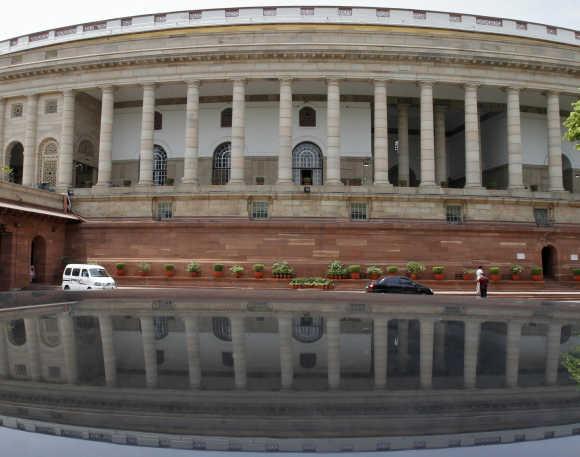 | « Back to article | Print this article |
Key Bills to be taken up as Parliament reconvenes
A slew of Bills that will have a significant effect on India's financial landscape are likely to come up in the five-week Monsoon session of Parliament beginning on Wednesday against the bleak landscape of deficient rainfall, a power crisis, a weak rupee and repeated downward revisions in the expected economic growth rate.
The Public Procurement Bill 2012 (which will streamline all purchases by government and is expected to bring down corruption) and the Food Security Bill 2011 (which will provide vulnerable sections with free food grain) and the Microfinance Institutions (Development and Regulation) Bill 2012 to regulate the microfinance sector will be introduced in Parliament.
Click NEXT to read more...
Key Bills to be taken up as Parliament reconvenes
Slated to be amended and passed are the Prevention of Money Laundering (Amendment) Bill 2011, the Companies Bill 2011 and the Banking Laws (Amendment) Bill. There is little clarity whether the Direct Taxes Code Bill will be tabled in this current session.
The Bill sought to tax shareholder funds for life insurance companies at a corporate tax rate of 30 per cent as against the current rate of 12.5 per cent, but which Parliament's standing committee moderated and brought down to 15 per cent.
Crucial Bills and their fate:
The Companies Bill 2011: Introduces the concept of corporate social responsibility, a fixed term for independent directors, etc.
Fate: Likely to be passed
Click NEXT to read more...
Key Bills to be taken up as Parliament reconvenes
Banking Laws (Amendment) Bill 2011: Removes the existing cap on voting rights of shareholders and enables easier bank mergers.
Fate: Unlikely to be passed
The Prevention of Money Laundering (Amendment) Bill 2011: Expands the definition of offences under money laundering to include activities like concealment, acquisition, possession and use of proceeds of crime.
Fate: May be passed
Land Acquisition, Rehabilitation and Resettlement bill 2011: Defines acquisition for public purpose, consent of 80 per cent of displaced people needed, stipulates quantum of compensation and defines rehabilitation mechanism.
Fate: Unlikely to be passed
As the government is eager to get as many Bills cleared as possible, the UPA is refraining from bringing Bills that involve contentious issues. Therefore, the Insurance Laws (Amendment) Bill and the Pension Fund Regulatory and Development Authority Bill are unlikely to be tabled.
Click NEXT to read more...
Key Bills to be taken up as Parliament reconvenes
The Insurance Bill seeks to raise the foreign direct investment limit in the sector from 26 to 49 per cent but the proposal has been rejected by the standing committee, which says the capital requirements of the sector should be routed through the domestic market.
The main opposition, the BJP, had agreed to the passage of the PFRDA Bill, provided an FDI cap of 26 per cent (the same as in insurance) was explicitly incorporated.
In many ways, the government's credibility and the Prime Minister's authority rest on this session. The next session will be held against a background of several Assembly elections, including in Gujarat, and will be clouded by political issues.



